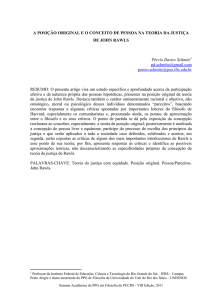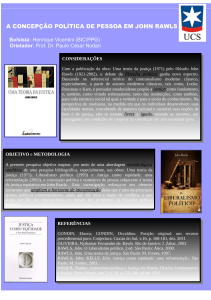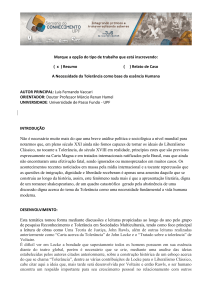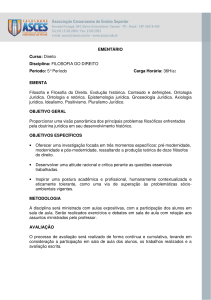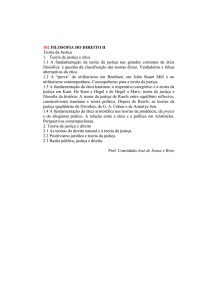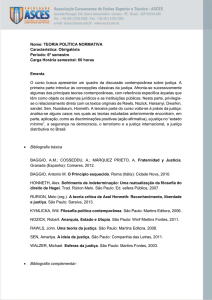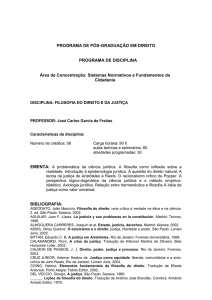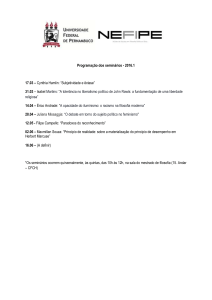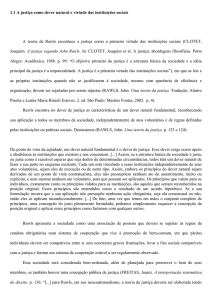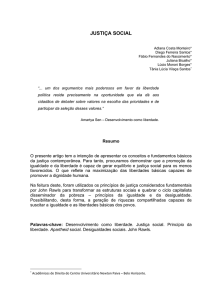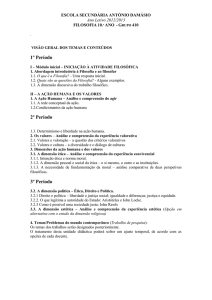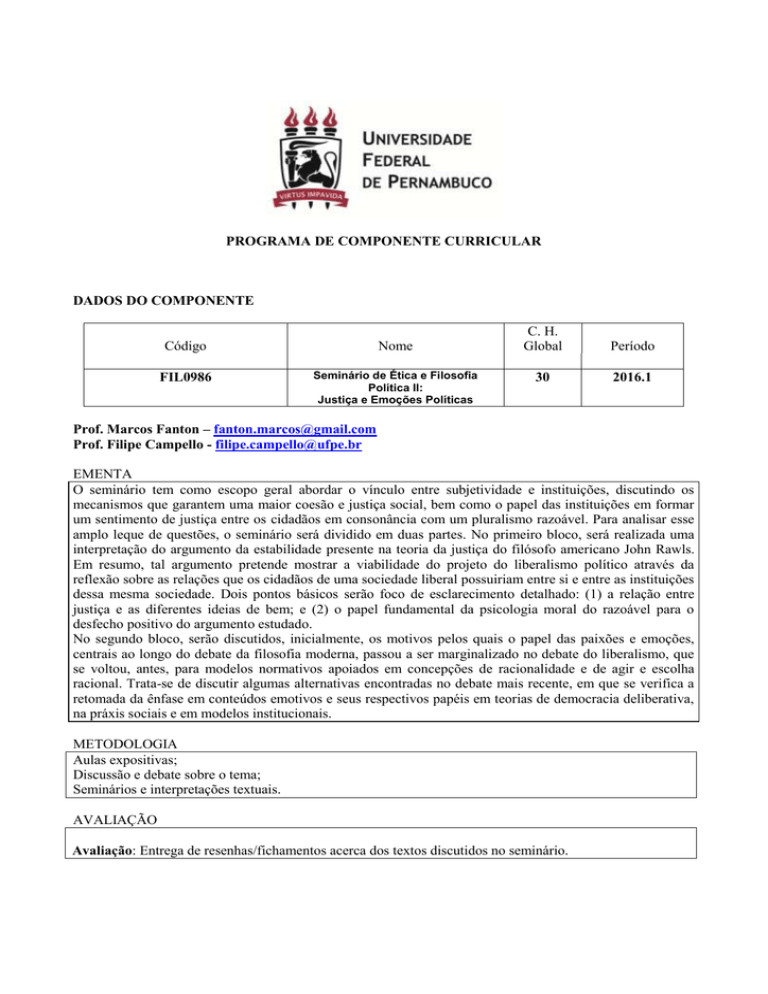
PROGRAMA DE COMPONENTE CURRICULAR
DADOS DO COMPONENTE
Código
Nome
FIL0986
Seminário de Ética e Filosofia
Política II:
Justiça e Emoções Políticas
C. H.
Global
Período
30
2016.1
Prof. Marcos Fanton – [email protected]
Prof. Filipe Campello - [email protected]
EMENTA
O seminário tem como escopo geral abordar o vínculo entre subjetividade e instituições, discutindo os
mecanismos que garantem uma maior coesão e justiça social, bem como o papel das instituições em formar
um sentimento de justiça entre os cidadãos em consonância com um pluralismo razoável. Para analisar esse
amplo leque de questões, o seminário será dividido em duas partes. No primeiro bloco, será realizada uma
interpretação do argumento da estabilidade presente na teoria da justiça do filósofo americano John Rawls.
Em resumo, tal argumento pretende mostrar a viabilidade do projeto do liberalismo político através da
reflexão sobre as relações que os cidadãos de uma sociedade liberal possuiriam entre si e entre as instituições
dessa mesma sociedade. Dois pontos básicos serão foco de esclarecimento detalhado: (1) a relação entre
justiça e as diferentes ideias de bem; e (2) o papel fundamental da psicologia moral do razoável para o
desfecho positivo do argumento estudado.
No segundo bloco, serão discutidos, inicialmente, os motivos pelos quais o papel das paixões e emoções,
centrais ao longo do debate da filosofia moderna, passou a ser marginalizado no debate do liberalismo, que
se voltou, antes, para modelos normativos apoiados em concepções de racionalidade e de agir e escolha
racional. Trata-se de discutir algumas alternativas encontradas no debate mais recente, em que se verifica a
retomada da ênfase em conteúdos emotivos e seus respectivos papéis em teorias de democracia deliberativa,
na práxis sociais e em modelos institucionais.
METODOLOGIA
Aulas expositivas;
Discussão e debate sobre o tema;
Seminários e interpretações textuais.
AVALIAÇÃO
Avaliação: Entrega de resenhas/fichamentos acerca dos textos discutidos no seminário.
CONTEÚDO PROGRAMÁTICO / BIBLIOGRAFIA BÁSICA
Bloco I – Rawls e a busca pela estabilidade política
Aula 01. O que é ter uma preferência racional? O primeiro argumento da posição original
RAWLS. Uma teoria da justiça. Cap. III (em especial, §§20 e 24); Capítulo VII (em especial, §§60,
64 e 66)
Aula 02. Primeira Parte. A justiça como equidade como utopia realista: introdução ao
argumento da estabilidade
RAWLS. Justiça como equidade: uma reformulação. Parte I (§§2-5) e V (§§54-7)
RAWLS. Uma teoria da justiça. §§1 e 69.
Segunda Parte. “Apesar de toda sua grandeza, o Leviatã, de Hobbes, levanta alguns
problemas especiais”: comentários a uma nota obscura de Uma teoria da justiça
RAWLS, Uma teoria da justiça. §38.
Aula 03. O senso de justiça
RAWLS. Uma teoria da justiça. Cap. VIII.
Aula 04. O argumento da congruência entre o justo e o bem
RAWLS. Uma teoria da justiça. Cap. IX
Aula 05. Um “grave problema interno” da justiça como equidade: A “virada política” de
Rawls e a noção de consenso sobreposto
RAWLS. Liberalismo Político. Introdução (de 1992 e de 1996); Conferência IV.
Bloco II – Emoções Políticas
Aula 06
Krause, Sharon. Civil Passions. Moral Sentiment and democratic deliberation. Princeton:
Princeton University Press, 2008. Introdução e capítulo 1
Aula 07
Walzer, Michael. Política e paixão. In: Política e paixão. Rumo a um liberalismo mais igualitário.
São Paulo: Martins Fontes, 2008.
Aula 08
Nussbaum, Martha C. Political Emotions: Why Love Matters for Justice. Cambridge, MA: Harvard
University Press. 2013, Cap. 1.
Aula 09
Nussbaum, Martha. Political Emotions, Cap. 8.
Aula 10
Mouffe, Chantal. Por um modelo agonístico de democracia. Rev. Sociol. Polít., Curitiba, 25, p. 1123, nov. 2005.
BIBLIOGRAFIA COMPLEMENTAR
Bloco I
Aula 01
HAUSMAN, D. Preference, value, choice, and welfare. Cambridge: Cambridge University Press,
2012.
MANDLE, J. The choice from the original position. In: MANDLE; REIDY (Org.). A Companion
to Rawls. Blackwell, 2014.
RAWLS. Liberalismo político. Conferência V. §§1-4.
RAWLS. Fairness to Goodness. In: Collected Papers.
RAWLS. Reply to Alexander and Musgrave. In: Collected Papers.
SEN, A. Collective choice and social welfare.
SEN, A. Escolha social e comportamento individual. In: _____. Desenvolvimento como liberdade.
Companhia das Letras, 2010.
Aula 02
HOBBES, T. Leviatã.
LLOYD, S. Ideals as interests in Hobbes’s Leviathan: the power of mind over matter. Caps. 1, 8 e
9.
RAWLS, J. Conferências sobre a história da filosofia política. Hobbes.
WEITHMAN, P. Why political liberalism? On John Rawls’s political turn. Introdução.
Aula 03
HILL JR, T.E. Stability, a sense of justice, and self-respect. In: MANDLE; REIDY (Org.). A
Companion to Rawls. Blackwell, 2014.
RAWLS. Conferências sobre história da filosofia política. Rousseau.
RAWLS. Lições da história da filosofia moral. Hegel.
BERCUSON, Jeff. John Rawls and the history of political thought: the rousseauvian and hegelian
heritage of justice as fairness. Caps. 2-3.
RICHARDSON; WEITHMAN. The philosophy of Rawls: a Collection of essays. v.4. Parte 2
(Moral development and a sense of justice)
ROUSSEAU, J.-J. O contrato social.
Aula 04
FREEMAN, Congruence and the good of justice. In: _____. Justice and the social contract: essays
on Rawlsian political philosophy. Oxford: Oxford University Press, 2007.
WEITHMAN, P. Why political liberalism? On John Rawls’s political turn. Caps. IV-VIII.
Aula 05
BARRY, B. John Rawls and the search for stability. Ethics, v. 105, n. 4, 1995, pp. 874-915.
GAUS, The turn to a political liberalism. In: MANDLE, J.; REIDY, D.A. A companion to Rawls.
Oxford: Blackwell, 2014.
MARTIN, R. Overlapping consensus. In: MANDLE; REIDY (Org.). A Companion to Rawls.
Blackwell, 2014.
RICHARDSON; WEITHMAN. The philosophy of Rawls: a Collection of essays. v.4. Parte 3
(Moral psychology, stability and the support they provide for “justice as fairness”).
WEITHMAN, P. Why political liberalism? On John Rawls’s political turn. Caps. IX-X.
Bloco II
Gibbard, Allan, Wise choices, apt feelings. A theory of normative judgment. Cambridge Mass.:
Harvard University Press, 1992
Hall, Cheryl ‘Passions and constraint’: The marginalization of passion in liberal political theory.
Philosophy Social Criticism 2002 28: 727.
Hall, Cheryl. Recognizing the Passion in Deliberation: Toward a More Democratic Theory of
Deliberative Democracy. Hypatia vol. 22, no. 4 (Fall 2007).
Hoggett, Paul; Thompson, Simon, Politics and the emotions. The affective turn in contemporary
political studies. New York: Continuum, 2012.
Kingston, Rebecca; Ferry, Leonard (Orgs.), Bringing the Passions Back In: The Emotions in
Political Philosophy. UBC Press, 2008.
Nussbaum, Martha C., Upheavals of thought. The intelligence of emotions. Cambridge / New
York: Cambridge University Press, 2001.
Nussbaum, Martha C. Political Emotions: Why Love Matters for Justice. Cambridge, MA:
Harvard University Press, 2013.
Redding, Paul, The logic of affect. Ithaca NY: Cornell University Press, 1999.
Solomon, Robert C. Not passion's slave. Emotions and choice. Oxford / New York: Oxford
University Press, 2003.
Sousa, Ronald de. The Rationality of Emotion. Cambridge, MA: MIT Press, 1987.

